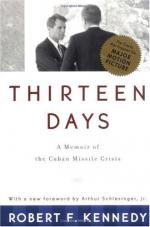
|
| Name: _________________________ | Period: ___________________ |
This test consists of 5 short answer questions, 10 short essay questions, and 1 (of 3) essay topics.
Short Answer Questions
1. When the Soviet Union refused to acknowledge the blockade, how often were low level flights conducted over Cuba?
2. According to the Afterword, what did victory mean pre-1945?
3. Who would analyze Khrushchev's personal letter and make recommendations on October 27th?
4. When JFK says, "this is the night I should go to the theater" (84), what famous historical figure is he referencing?
5. What does Robert suggest the President use to get an opposite opinion if no one else will offer it?
Short Essay Questions
1. How did Africa play a role in the Cuban Missile Crisis?
2. Analyze the simile "the leaders who lived through the crisis felt what it was like to peer over the precipice" (104)?
3. What is JFK referencing when he says that "we are now in an entirely new ball game" (74)? What has changed?
4. How does JFK view the military advisers recommending war? Why does he feel this way?
5. In the letter drafted by Robert and Sorenson in response to Khrushchev's letter received October 26th, what is the "first ingredient" (79) to a peaceful arrangement? Why?
6. What does Robert mean when he says "that with respect to nuclear war there is an awesome crack between unlikelihood and impossibility" (105)?
7. How does an official from the Soviet Embassy deliver a message in an unorthodox manner? Why is it thought to be credible? What was the message?
8. Why does Robert believe that a devil's advocate is necessary for the President?
9. After the Soviet's agree to a stand down, JFK makes an analogy between himself and Abraham Lincoln. What does he say and what does it mean?
10. Who did JFK seek advice from? Why?
Essay Topics
Write an essay for ONE of the following topics:
Essay Topic 1
Because of Khrushchev's clandestine behavior and known desire to take over Berlin, a comparison is made between him and Hitler. In an essay, compare and contrast Khrushchev and Hitler. In what key ways are they different? Focus on the events in Cuba and Munich.
Essay Topic 2
Checks and Balances are built into the Constitution to protect the people from tyranny and to prevent an abuse of power. Congress was furious that JFK did not consult with them before making his military decision. In an essay, determine whether or not the checks and balance work.
Essay Topic 3
Robert Kennedy, Richard Neustadt, and Graham Allison all identify isolationism to be a problem. In an essay, identify why people would desire isolationism and determine if isolationism is even an option in today's world. Why or why not? Make a conclusion at the end of your determining if isolationism is truly a good idea or not? Use citations from Thirteen Days in your arguments.
|
This section contains 1,370 words (approx. 5 pages at 300 words per page) |

|




